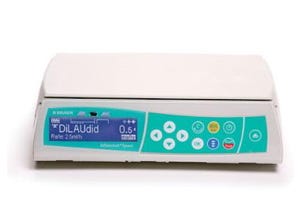Why B. Braun Is in a Spat Over Infusion Pump Ratings
May 11, 2016
The nonprofit medtech research group ECRI Institute dubbed a B. Braun infusion pump "fair," prompting the company to question ECRI's testing methods.
Nancy Crotti
|
B. Braun's Infusomat Space Infusion System, as shown on the company's website. |
B. Braun Medical has accused the ECRI Institute of "lax protocol test methods" after the healthcare research organization gave one of Braun's infusion pumps a "fair" rating.
ECRI gave B. Braun's second-generation Infusomat Space Pump a "good" rating in four out of five categories --safety, interoperability, performance, and maintenance --and "fair" in the workflow category, according to a statement from the company. However, the institute assigned the pump only a "fair" rating overall, igniting Braun's ire.
"ECRI is a well-respected institution and we recognize the important role it plays in shaping the opinion of medical device purchasers," said company spokesman Rob Albert in the statement. "That's why it's troubling that the institute doesn't have a scientific, protocol-driven methodology for evaluating infusion pumps."
ECRI, a not-for-profit consulting group, said in a statement that it has several safety concerns with the pump's error-reduction system, or DERS. "Some of the pump's DERS indications/alerts are unclear, and the pump's workflow is also limited by its small screen," the group said.
A Braun spokesperson said the company is a member of the institute, and that it has disagreed with previous designations.
Braun said it had used "rigorous human-factors testing" to help redesign Infusomat, a large-volume pump. Braun also said it found the rating confusing because it redesigned the pump to make its operation more intuitive. The company worked with nonprofit Canadian consulting group Healthcare Human Factors and put the device through 100 hours of usability testing with 100 practicing RNs and anesthesiologists.
"ECRI does not have adequate experience or scientific research to support its evaluation of infusion pump workflow," Albert added. "Opinion is not science." Healthcare Human Factors, the consulting group B. Braun paid to help test the pump, also piled on, calling ECRI's track record for assessing infusion pumps "concerning."
"It's difficult, if not impossible, to assess a product on these merits without a controlled usability test using actual intended clinical users," said Joseph Cafazzo, PhD, executive director of medical engineering and Healthcare Human Factors at the University of Toronto.
Over the past six years, two competing pumps made by Baxter and Hospira received "acceptable" or "recommended" ratings from ECRI and later faced FDA-imposed import bans, recalls, discontinuation, or destruction affecting a total of more than 200,000 individual devices, B. Braun noted.
A rating of "fair" can hamper sales, added Braun spokesperson Constance Walker.
"We have competitors in the market and we're all trying to influence the purchasing decisions of healthcare organizations, and an ECRI rating can be used in sales discussions," Walker said.
Braun was recently in the news for a Class I recall of more than 1000 of its Dialog+ hemodialysis systems due to cracks in conductivity sensors. No injuries were reported.
Infusion pumps have been among the most recall-plagued medical devices in the past decade, leading to more rigorous usability testing requirements for medical devices writ large.
Infusomat was among the first infusion pumps to be cleared by FDA by applying a new human factors and usability engineering process, according to Braun.
Learn more about cutting-edge medical devices at MD&M East, June 14-15, 2016 in New York City. |
Nancy Crotti is a contributor to Qmed and MPMN.
Like what you're reading? Subscribe to our daily e-newsletter.
About the Author(s)
You May Also Like

.png?width=300&auto=webp&quality=80&disable=upscale)

